Poppy Seeds vs Other Seeds: A Seed Showdown

Did you know poppy seeds come from the opium poppy plant? These tiny seeds are often found in baked goods. They add a unique flavor, making them a favorite worldwide. Poppy seeds bring a nutty and fruity taste to many dishes.
They’re used in everything from pastries to dressings. Their mild nuttiness and gentle crunch make them special. This guide will show you why poppy seeds are so great.
We’ll compare poppy seeds vs other seeds such as sesame, flax, and sunflower seeds. Whether you’re a pro in the kitchen or just love trying new foods, you’ll learn a lot. Get ready to dive into the world of poppy seeds.
What Are Poppy Seeds?
Poppy seeds are small, oil-rich seeds from the opium poppy plant (Papaver somniferum). They have a long history and are used in many dishes. Let’s look into their origins, how they are grown, their taste, and how they look.
Origin and Cultivation
Poppy seeds come from the Middle East, Asia, and parts of Europe. The opium poppy plant has been grown for centuries in these areas. It’s used for both its seeds and the opium it produces. Poppy seeds are a key ingredient in many traditional dishes, showing their importance in culture.
Growing poppy seeds is a careful process. The plants need well-drained soil and moderate temperatures to grow well. Farmers take great care of their poppy fields. This ensures the seeds get their unique blue-black or gray-black color and a nutty flavor.
Taste and Appearance
Poppy seeds are known for their classic blue-black or gray-black color and a mild nutty taste with a hint of sweetness. They are small and crunchy, adding a delightful texture to dishes. Whether on bread, in baked goods, or as a garnish, poppy seeds add a special touch.
“Poppy seeds are a versatile and flavorful addition to a wide range of dishes, from savory to sweet. Their distinctive appearance and taste make them a beloved ingredient around the world.”
Adding poppy seeds to your meals is a great way to try new flavors and textures. They are perfect for baking or seasoning, offering a burst of flavor and nutrition.
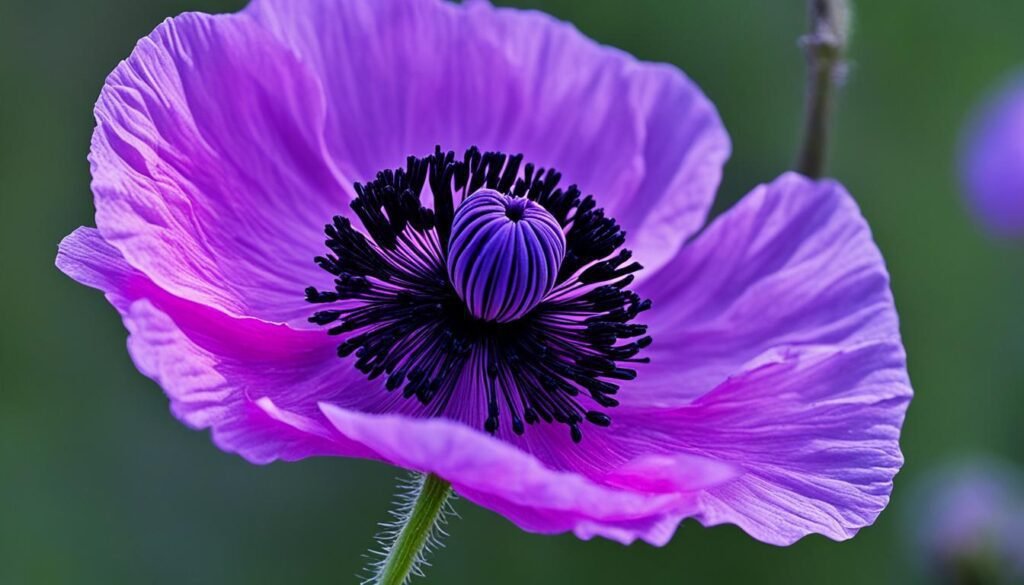
Poppy Seeds vs Other Seeds: Nutritional Comparison
Comparison of Poppy seeds vs other seeds are a great choice for those looking to boost their nutrition. They are packed with vitamins, minerals, and healthy fats. These nutrients make poppy seeds a top pick for a healthy diet.
Protein Content
Poppy seeds have a good amount of protein, even if they’re not the highest. A 30-gram serving gives you about 6 grams of protein. This can help with your daily protein needs.
Other seeds like sunflower, chia, and flax have a bit more protein. They offer 7 to 9 grams per 30 grams. Still, poppy seeds are a solid choice for protein.
Healthy Fats
Poppy seeds are full of healthy fats, especially unsaturated ones. They have a lot of omega-6 fatty acids, like linoleic acid. In fact, they have over 50% linoleic acid. This is great for heart health and reducing inflammation.
Poppy seeds have a better fatty acid mix than some other seeds. Chia seeds are known for omega-3s but have less omega-6. Sunflower seeds have more omega-6 but not as many fatty acids overall.
| Seed | Protein (g/30g) | Healthy Fats (g/30g) | Omega-6 (g/30g) |
|---|---|---|---|
| Poppy Seeds | 6 | 28.57 | 28.30 |
| Chia Seeds | 9 | 18.27 | 3.64 |
| Sunflower Seeds | 7 | 15.30 | 14.67 |
| Flax Seeds | 8 | 22.81 | 5.91 |
Adding poppy seeds to your meals can be a smart move. They offer a great mix of healthy fats, protein, and vitamins and minerals.
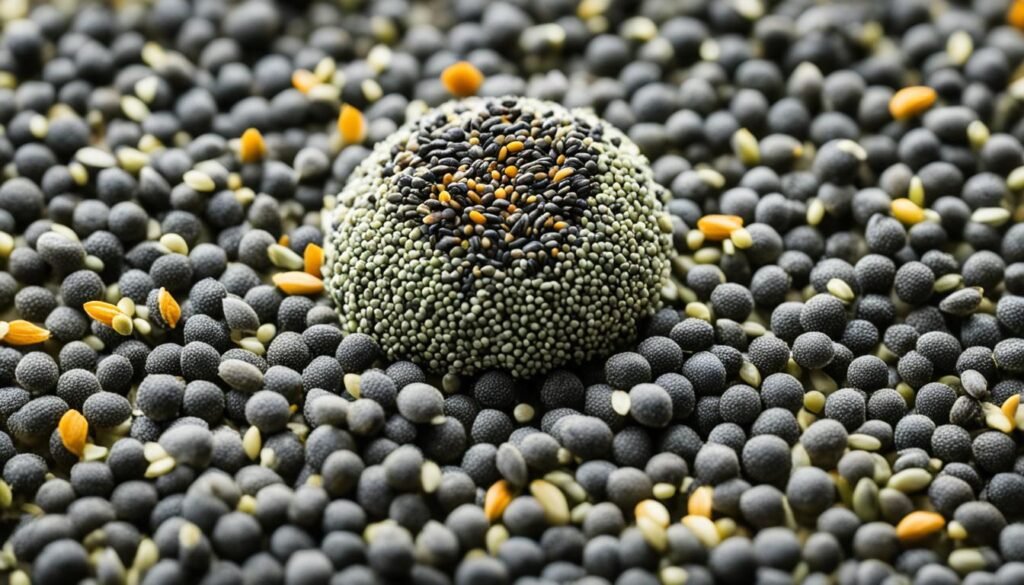
Poppy Seeds vs Hemp Seeds: A Closer Look
Both poppy seeds and hemp seeds are packed with nutrients. They have different nutritional profiles, catering to various dietary needs and preferences.
Poppy seeds and hemp seeds have similar calories, about 166 per 30-gram serving. But, they differ in their fat content. Hemp seeds have more healthy fats, including omega-3 and omega-6 fatty acids. Poppy seeds don’t have these essential fatty acids.
Hemp seeds are a great source of protein, offering 9.47 grams per 30-gram serving. Poppy seeds provide 5.95 grams of protein. Hemp seeds are also complete proteins, meaning they have all nine essential amino acids.
- Hemp seeds are higher in healthy fats, with a greater proportion of omega-3 and omega-6 fatty acids.
- Hemp seeds offer more protein, with a complete amino acid profile.
- Poppy seeds are higher in certain minerals, such as calcium and iron.
Poppy seeds are rich in minerals like calcium and iron. They have 380 milligrams of calcium and 3.96 milligrams of iron per 30-gram serving. Hemp seeds have less of these minerals.
Choosing between poppy seeds and hemp seeds depends on your nutritional needs and preferences. Adding both to your diet can ensure a balanced intake of essential nutrients and support your health.
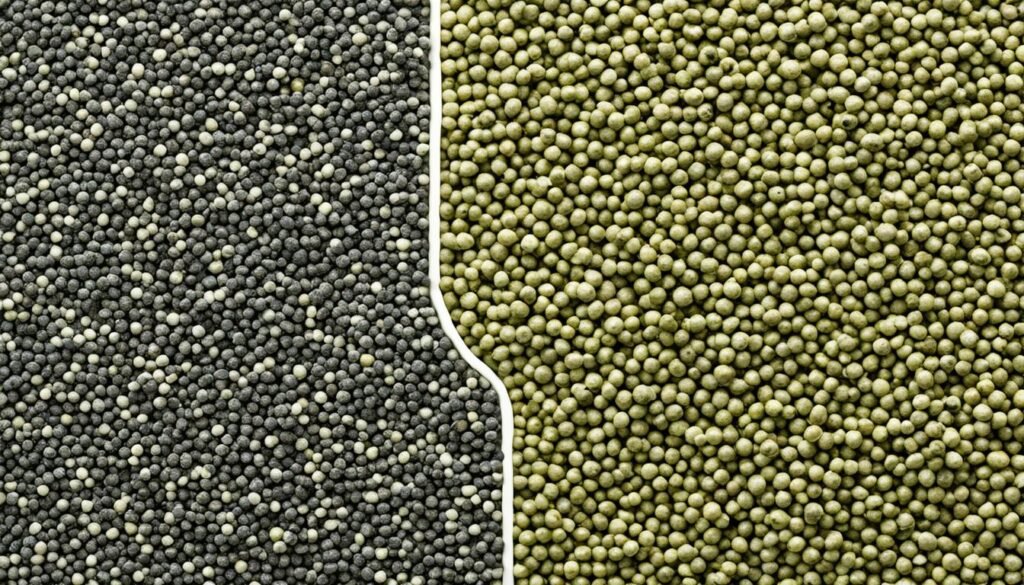
“Consuming a variety of nutrient-dense seeds can provide a wide range of health benefits, from improved heart health to better digestion and immune function.”
Poppy Seeds vs Sesame Seeds: Taste and Texture
Poppy seeds and sesame seeds are unique in the culinary world. Poppy seeds have a mild, nutty taste and a soft crunch. They add a subtle delight to many baked goods. Sesame seeds, especially black ones, have a strong, earthy flavor. This makes them perfect for savory dishes.
Flavors and Aromas
Poppy seeds are known for their mild, nutty taste with a hint of sweetness. They are tiny, about 1 millimeter long, and have a light aroma. Sesame seeds have a deeper nuttiness. Black sesame seeds have a richer, earthier taste than white ones.
Culinary Applications
- Poppy seeds are often used in baked goods, like breads, pastries, and muffins. They add texture and look great.
- Sesame seeds are used in savory dishes, such as sauces, dressings, and stir-fries. They also appear in some sweet dishes, like tahini and sesame bars.
- Poppy seeds can replace sesame seeds in a 1:1 ratio by volume. They have a similar nutty taste and texture.
Poppy seeds and sesame seeds bring unique flavors and textures to the table. They can be used in many delicious dishes. Whether you’re making lemon-poppy seed muffins or a savory tahini sauce, these seeds offer endless possibilities.
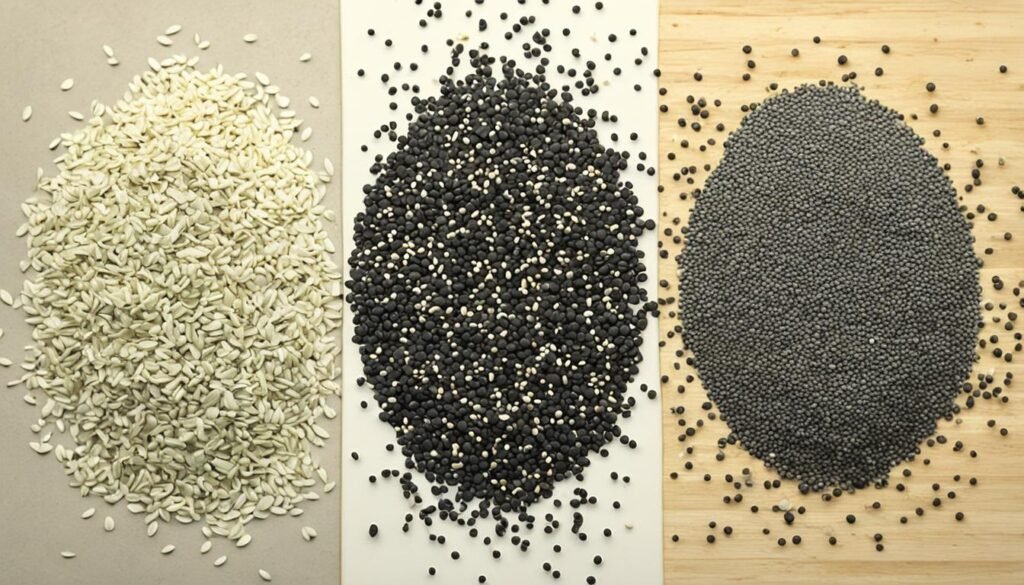
Poppy Seeds vs Flax Seeds: Health Benefits
Poppy seeds and flax seeds are small but powerful for our health. They have different nutritional benefits and health effects. Let’s explore what makes them special.
Digestive Health
Poppy seeds are full of dietary fiber, which is great for your gut. This fiber helps good gut bacteria grow and prevents constipation. Poppy seeds also have compounds that can soothe the nervous system, helping with digestive problems.
Heart Health
Flax seeds are packed with omega-3 fatty acids, like alpha-linolenic acid (ALA). These fats are good for the heart, lowering inflammation and cholesterol. Eating flax seeds regularly can reduce heart disease risk and boost heart health.
Both poppy seeds and flax seeds are great for a healthy diet. They offer unique benefits for digestion and heart health. Adding these seeds to your meals can improve your overall well-being.
| Nutrient Comparison | Poppy Seeds | Flax Seeds |
|---|---|---|
| Fiber (per 100g) | 19.5g | 27.3g |
| Omega-3 Fatty Acids (per 100g) | 0.13g | 22.8g |
| Calcium (per 100g) | 1,150mg | 277mg |
| Iron (per 100g) | 13.2mg | 5.7mg |
“Incorporating both poppy seeds and flax seeds into your diet can provide a well-rounded approach to supporting your overall health and wellness.”
Poppy Seeds vs Chia Seeds: Versatility in Cooking
Poppy seeds and chia seeds are great in the kitchen. They are used in many ways, from baking to making condiments. They make your food taste better and are good for you too.
Baking with Seeds
Poppy seeds and chia seeds are stars in baking. Poppy seeds are perfect for pastries and bagels because of their nutty taste and crunch. Chia seeds can be added to many baked goods, like breads and muffins. They also work as an egg substitute, adding nutrition and texture.
Seed-Based Condiments
These seeds are also great for making condiments. You can make poppy seed dressings and chia seed-based jams and spreads. They’re perfect for dressing salads or adding flavor to your toast.
Poppy seeds and chia seeds are versatile. They let cooks at home and in restaurants get creative with their dishes. From sweet treats to savory condiments, these seeds are unmatched in versatility.
“Both poppy seeds and chia seeds are incredibly versatile ingredients that can elevate the flavor and nutrition of a wide variety of dishes.”
Poppy Seeds vs Sunflower Seeds: Appearance and Texture
Poppy seeds and sunflower seeds look and feel very different. Poppy seeds have a unique blue-black or gray-black color. This makes them stand out in any dish. They are also crunchy, which adds a fun texture to your food.
Sunflower seeds are bigger and have a tan or striped shell. They are crunchier and often eaten as a snack. They’re also great in salads and trail mixes.
Poppy seeds are often used for decoration on breads and pastries. Sunflower seeds are versatile in cooking. They add visual appeal and a satisfying crunch to many dishes.
| Characteristic | Poppy Seeds | Sunflower Seeds |
|---|---|---|
| Appearance | Blue-black or gray-black color | Tan or striped shell |
| Texture | Delicate, crunchy | Substantial, crunchy |
| Culinary Uses | Decorative appeal, topping breads and pastries | Snack, salads, trail mixes |
Poppy seeds and sunflower seeds bring unique looks and textures to your food. Whether you want elegance with poppy seeds or crunch with sunflower seeds, these ingredients can make your dishes special.
Poppy seeds vs other seeds
Poppy seeds are a unique and versatile choice among the many seeds out there. They may be small, but they bring a big flavor with their delicate, nutty taste and crunchy texture. This makes them a great addition to both sweet and savory dishes. They stand out when compared to seeds like sesame, flax, and chia.
Poppy seeds are packed with nutrients. They offer about 21 grams of protein per 100 grams. They also have a lot of fiber, which is good for your digestion and can help control blood pressure and cholesterol. Plus, they give you important minerals like calcium, which keeps your bones and teeth strong.
| Nutrient | Poppy Seeds | Sesame Seeds |
|---|---|---|
| Protein | 21 g per 100 g | 17 g per 100 g |
| Fiber | 19 g per 100 g | 12 g per 100 g |
| Calcium | 1,150 mg per 100 g | 975 mg per 100 g |
Poppy seeds are not just nutritious; they are also incredibly versatile. While sesame seeds are known for their nutty taste, poppy seeds can be used in many different dishes. They add a delicate texture and mild flavor to everything from baked goods to sauces and condiments.
Poppy seeds have a rich history that spans thousands of years. Today, they are loved around the world, especially in Central European and South Asian cooking. From the blue poppy seeds in Polish pastries to the black and white ones in Indian chutneys, they play a big role in many cuisines.
If you want to add a special touch to your cooking or try new flavors, poppy seeds are a great choice. They offer a unique mix of taste, texture, and nutrition that makes them a standout among all the seeds out there.
Incorporating Poppy Seeds into Your Diet
Poppy seeds are a great way to make your meals tasty and nutritious. You can sprinkle them on salads, yogurt, or oatmeal. Or, use them in baked goods like muffins, breads, and bagels. They’re also great for making dressings, dips, and coatings for meats or fish.
Recipes and Meal Ideas
Adding poppy seed recipes to your meals is simple and tasty. Here are some dishes you can try:
- Lemon and Poppy Seed Bread
- Poppy Seed Coleslaw
- Lemon Poppy Seed Chicken
- Poppy Seed Bagels
- Orange Poppy Seed Muffins
- Spinach and Poppy Seed Quiche
The crunchy and nutty taste of poppy seed meal ideas can make many dishes better. They work well in baked goods, salads, and more.
Storage Tips
Keep poppy seeds in an airtight container in a cool, dark place. This keeps them fresh and flavorful. Proper storage helps you get the most out of these nutritious seeds.
Adding poppy seeds to your diet brings flavor and nutrition to your meals. They’re versatile and valuable in any kitchen.
Allergy Considerations for Poppy Seeds
Poppy seeds are usually safe to eat, but some people might have allergic reactions. Poppy seed allergies are not common but can happen. Symptoms include skin rashes, hives, stomach problems, or anaphylaxis in bad cases.
Studies show that spice allergy affects 2% of food allergies, mostly in adults. Some spices have set limits for allergies, like dried celery spice, sesame, and mustard. Allergies to spices can be mild, causing itching and swelling, or severe, leading to anaphylactic shock.
If you’re allergic to poppy seeds, avoid them and foods with them. Poppy seed allergy might also react with other seed allergies, making it hard for those with many food allergies. Always ask about food allergies or restrictions when hosting to make sure everyone is safe.
Allergen immunotherapy, especially sublingual immunotherapy, can help reduce poppy seed allergies. Curex offers online telemedicine for this treatment, with insurance coverage for tests. This can make managing allergies easier and cheaper for patients.
| Allergy Statistic | Percentage/Value |
|---|---|
| Spice allergy cases | 2% of all food allergy cases |
| Reactive thresholds for some spices | Dried celery spice 160 mg, sesame 30 mg, mustard 40 mg |
| Risk of food allergies in women | Double the risk compared to men |
Knowing about poppy seed allergies helps you enjoy poppy seeds safely. It’s all about keeping your health and safety in mind.
Conclusion
Poppy seeds are a versatile and nutritious ingredient. They bring unique flavors, textures, and health benefits to the table. These tiny seeds come from the Middle East and Asia and are loved worldwide.
They can be sprinkled on salads, added to baked goods, or used in dressings and condiments. Poppy seeds add a delightful crunch and a nutty, subtly sweet note to dishes.
Poppy seeds are packed with protein, healthy fats, and essential minerals. They are great for a balanced diet. By using poppy seeds, you can explore new culinary possibilities and enjoy their unique taste.
Poppy seeds help with weight loss, support good bone health, aid in blood clotting, and prevent heart disease. The poppy seed benefits are truly amazing.
Adding poppy seeds to your cooking and baking can boost nutrition and flavor. They are perfect for both seasoned cooks and beginners. Poppy seeds are a great way to make your meals and snacks more exciting.
FAQ
What are the main differences between poppy seeds and other seeds?
Poppy seeds have a mild, nutty taste and a delicate crunch. They are small and blue-black or gray-black in color. This makes them different from sesame, flax, and chia seeds.
What are the health benefits of poppy seeds?
Poppy seeds are packed with protein, healthy fats, fiber, and minerals like calcium and magnesium. They support digestive health, heart health, and overall well-being when eaten as part of a balanced diet.
How do poppy seeds compare to hemp seeds and sesame seeds in terms of nutrition and culinary uses?
Poppy seeds have fewer calories and fats than hemp seeds but are richer in certain minerals. Sesame seeds have a strong, earthy taste and are often used in savory dishes. Poppy seeds are versatile, fitting well in both sweet and savory dishes.
What are the key differences between poppy seeds and flax seeds or chia seeds?
Flax seeds are high in omega-3 fatty acids, which are good for the heart. Poppy seeds are rich in fiber and may calm the nervous system. Both chia seeds and poppy seeds are versatile in the kitchen, used in many baked goods and condiments.
How do poppy seeds differ in appearance and texture from sunflower seeds?
Poppy seeds are smaller and more delicate than sunflower seeds, which are larger and crunchier. Poppy seeds are often used for decoration. Sunflower seeds are enjoyed as a snack or in savory dishes.
How can you incorporate poppy seeds into your diet?
You can sprinkle poppy seeds on salads, yogurt, or oatmeal. They’re great in baked goods like muffins and breads. They can also be added to dressings, dips, or used as a coating for meats or fish. Keep them fresh by storing them in an airtight container in a cool, dark place.
Are there any allergy concerns with poppy seeds?
Poppy seed allergies are not common but can happen. Symptoms include skin rashes, hives, digestive issues, or anaphylaxis in severe cases. Be aware of food allergies or dietary restrictions when using poppy seeds or dishes with them.
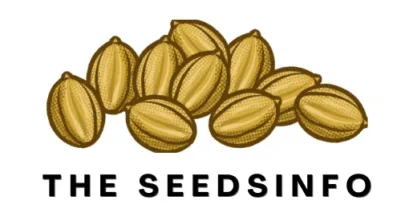


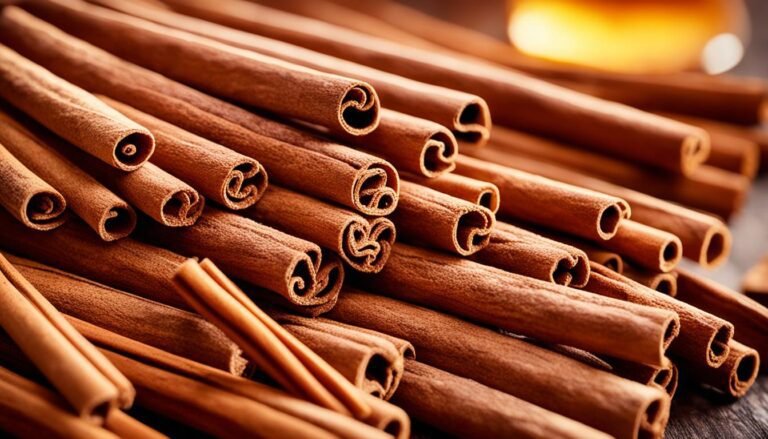


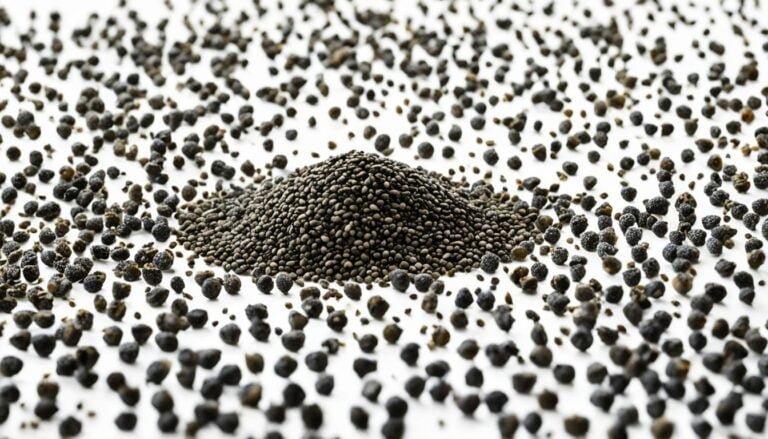
One Comment